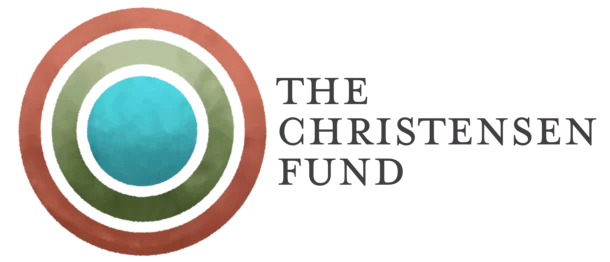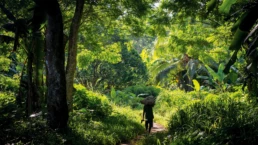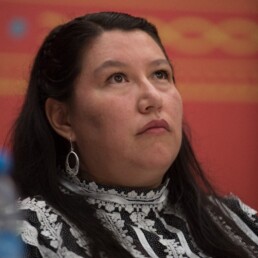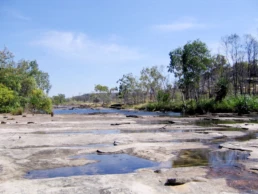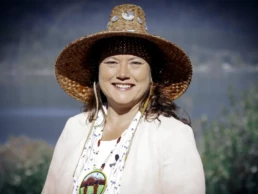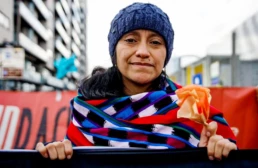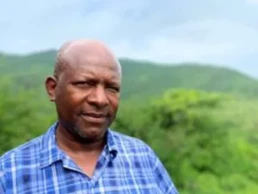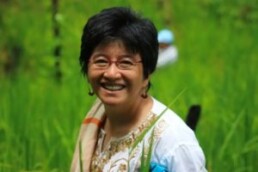The Christensen Fund Details Indigenous Peoples and Local Communities Pledge Commitments
Updated August 19, 2024
At the World Leaders Summit at COP26, the Christensen Fund joined the UK, Norway, Germany, the US, and the Netherlands, and over 15 private funders in a collective pledge of 1.7 billion USD for Indigenous and local communities to protect tropical forests that are vital ecosystems to address climate change, biodiversity loss, and pandemic risk. The Christensen Fund joined this pledge in recognition of the importance of the rights and self determination of Indigenous Peoples in climate finance commitments.
In carrying out our part of the pledge, The Christensen Fund is committed to:
1. Upholding the United Nations Declaration on the Rights of Indigenous Peoples (UNDRIP) in all of our actions,
2. Practicing transparency regarding our giving practices in carrying out our commitment to the wider pledge, and;
3. Being accountable by providing regular updates on our grantmaking, how we are engaging with other signatories, and how we are encouraging the participation of Indigenous peoples throughout the five years of the pledge.
To honor the self determination and the rights of Indigenous Peoples as affirmed by the UNDRIP, The Christensen Fund is providing direct support to organizations and community partners whose work and ways of life sustain and protect tropical forests. Below is a list of the organizations we have supported to date of which 76.62% are Indigenous-led organizations, and 89.78% of the grants offer unrestricted and flexible funding. 100% of the organizational support that The Christensen Fund provides is for the benefit of Indigenous Peoples. Grants (or portions thereof) that support this pledge made in 2024 as of August 19 total $3,842,500.00 to the following partner organizations:
- Aliansi Masyarakat Adat Nusantara
- Asia Indigenous Peoples Pact Foundation
- Asociación Civil de Trabajo Socioambiental de la Amazonía WATANIBA
- Charapa Consult
- Cultural Survival
- Dynamique des Groupes de Peuples Autochtones (DGPA)
- Environmental Defenders Collaborative
- Forest Peoples Programme
- Global Alliance of Territorial Communities
- If Not Us Then Who
- Indigenous Peoples Movement for Self-Determination and Liberation, Inc
- Indigenous Peoples Rights, Inc
- International Indian Treaty Council
- International Indigenous Women’s Forum
- International Land and Forest Tenure Facility
- International Work Group for Indigenous Affairs
- Mongabay Org Corporation
- Muuch-Kambal AC
- Ogiek Peoples’ Development Program
- Pawanka Fund
- Podáali – Fundo Indígena da Amazônia Brasileira
- Pueblo Originario Kichwa de Sarayaku
- Rainforest Foundation, Inc.
- Rainforest Foundation Norway
- Re:wild
- Rights and Resources Institute, Inc
- Tebtebba Foundation, Inc
- Ujamaa Community Resource Team
- Yayasan Anak Dusun Papua
Grants (or portions thereof) that support this pledge made in 2023 total $5,336,000 to the following partner organizations:
- Acuavita Foundation, for their fiscally sponsored project Comité para el Seguimiento a los 11 Planes de Justicia para Pueblos Indígenas
- Aliansi Masyarakat Adat Nustantra (AMAN)
- Awé Tibúame
- Carto-crítica
- Centro de Capacitacion y Defensa de los Derechos Humanos e Indigenas A.C.
- Centro de Derechos Humanos de la Montaña Tlachinollan, A.C.
- Centro Mexicano de Derecho Ambiental, A.C.
- Cordillera Peoples Alliance, Inc.
- El Quinto Elemento Laboratorio de Investigación e Innovación Periodística
- Environmental Law Alliance Worldwide
- Estudios Rurales y Asesoría AC
- Federación Indígena Empresarial y Comunidades Locales de México A. C. (CIELO)
- Fondo Defensores A.C.
- Fondo Defensores for their fiscally sponsored project Indigenous Rights Law Clinic
- Forest Peoples Programme
- Foro Para el Desarrollo Sustentable A.C.
- Fundacion Pro Defensa de la Naturaleza y sus Derechos, for their fiscally sponored project Accion Ecologica
- Fundación Tosepan A.C.
- Indigenous Movement for Peace Advancement and Conflict Transformation (IMPACT)
- Indigenous Peoples Movement for Self-Determination and Liberation (IPMSDL)
- Indignación Promoción y Defensa de los Derechos Humanos AC
- Instituto Mexicano de Desarrollo Comunitario A.C.
- International Treaty Indian Council
- Kumoontun
- Litigio Estratégico Indígena
- Muuch-Kambal AC
- Namati
- Observatorio Latinoamericano de Derechos Colectivos y Conflictos Socioambientales
- Periodismo De Abajo
- Podaali – Fundo Indigena da Amazonia Brasileira
- Proyecto de Derechos Sociales Económicos y Culturales
- Raíchali Independiente A.C.
- Rainforest Foundation USA
- Re:wild
- Redes para la Diversidad y la Equidad A.C.
- Rhizomatica Communications
- Rights and Resources Institute, Inc
- Servicios Integrales Emuri A.C. (SINÉ)
- Snowchange Cooperative
- Somos Viento
- Synchronicity Earth USA
- Tarahumara’s Children Hospital for their fiscally sponsored project Centros Culturales de la Tarahumara
- Telecomunicaciones Indígenas Comunitarias AC
- Tequio Jurídico A.C.
- Timo Patla Intercultural
- Tsikini A.C.
- U Yix Lu’um
Grants (or portions thereof) that support this pledge made in 2022 total $5,495,000 to the following partner organizations:
- Articulação dos Povos e Organizações Indígenas do Nordeste, Minas Gerais e Espírito Santo (APOINME)
- Asociacion Civil de Trabajo Socioambiental de la Amazonia WATANIBA
- Centro de Derechos Humanos de la Montaña Tlachinollan, A.C.
- Cordillera Peoples Alliance, Inc.
- Cultural Survival
- Fondo Defensores
- Forest Peoples Programme
- Fundacion Karisma
- Fundación Tosepan A.C.
- Global Greengrants Fund
- Indigenous Movement for Peace Advancement and Conflict Transformation (IMPACT)
- Instituto Mexicano de Desarrollo Comunitario A.C. (IMDEC) for their fiscally sponsored project Fondo Defensores
- Indigenous Peoples Movement for Self-Determination and Liberation (IPMSDL)
- Indigenous Peoples Rights International and their US Public Charity Indigenous Peoples Rights, Inc.
- International Working Group on Indigenous Affairs
- Land is Life
- Ogiek Peoples Development Programme (OPDP)
- Rainforest Foundation USA
- Redes para la Diversidad y la Equidad A.C.
- Redes para la Diversidad y la Equidad A.C. for their fiscally sponsored project Chicharras
- Redes para la Diversidad y la Equidad A.C. for their fiscally sponsored project Ojo de Agua
- Servicios Integrales Emuri A.C. (SINÉ) for their fiscally sponsored project Futuros Indígenas
- Synchronicity Earth USA
- Tebtebba Foundation, Inc.
- Tsikini A.C.
- Yayasan Anak Dusun Papua
Grants (or portions thereof) that support this pledge made in 2021 total $2,869,400 to the following partner organizations:
- Centro Mexicano de Derecho Ambiental, A.C.
- Cultural Survival
- Federación Indígena Empresarial y Comunidades Locales de México A. C. (CIELO)
- Foro Para el Desarrollo Sustentable A.C.
- Indigenous Peoples Rights International and their US Public Charity Indigenous Peoples Rights, Inc.
- Instituto Mexicano de Desarrollo Comunitario A.C. (IMDEC)
- Instituto Mexicano de Desarrollo Comunitario A.C. (IMDEC) for their fiscally sponsored project Fondo Defensores
- International Land and Forest Tenure Facility
- International Working Group on Indigenous Affairs
- Land is Life
- Namati
- Redes para la Diversidad y la Equidad A.C.
- Redes para la Diversidad y la Equidad A.C. for their fiscally sponsored project Ojo de Agua
- Servicios Integrales Emuri A.C. (SINÉ)
- Servicios Integrales Emuri A.C. (SINÉ) for their fiscally sponsored project Futuros Indígenas
- Tebtebba Foundation, Inc.
- Tequio Jurídico A.C.
The Christensen Fund will update its activities under the pledge at least quarterly. We look forward to continued engagement to ensure best practices in this important work. Please do not hesitate to contact us with any questions at info@christensenfund.org.
The Christensen Fund Announces Second Cohort of Indigenous Leaders Program
In 2022, The Christensen Fund launched its Indigenous Leaders Program, a cohort of leaders from Indigenous communities across the globe. This 2-year program supported four amazing leaders from Mexico, Kenya, the Philippines, and the United States. The Christensen Fund provided financial support for these leaders to connect with each other, our staff, and our board, to attend various meetings and retreats throughout their participation in the program from 2022 through 2023. We deeply appreciate each of their contributions to supporting Indigenous Peoples everywhere.
We are now honored to introduce and welcome our 2024-2025 Indigenous Leaders Program Participants. The program celebrates four Indigenous leaders from Mexico, Cameroun, Indonesia, and the United States who are advancing the inherent rights, dignity, and self-determination of their communities, Nations, and Peoples while working to achieve the promise of the United Nations Declaration on the Rights of Indigenous Peoples (UNDRIP).
The Leaders Program was developed collaboratively with these Indigenous leaders in order to respect their prior commitments and demands on their time. In the spirit of self determination, these leaders will focus on issues or projects that they determine themselves. The program also holds space for these leaders to collaborate, learn from each other, and share reflections on the issues most important to them while enjoying the full support of each of their knowledge and experiences.
Yásnaya Aguilar (Mexico)
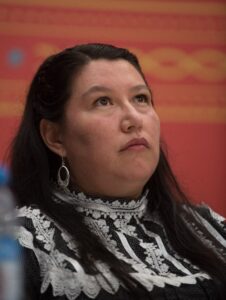 Yasnaya is an Ayuuk Indigenous writer, linguist, translator, researcher, and activist. Her work focuses on the promotion and study of the linguistic diversity and the endangered Indigenous languages in México. She is part of the COLMIX Collective, devoted to the research and promotion of the Indigenous Mixe Culture and collaborates with the Research Library Juan Córdoba, a specialized library on Indigenous cultures. In addition, she is actively involved in her community's system of self-government and the defense of her communities' natural resources and water, as well as defending the rights of Indigenous Peoples and the defense of the Ayuuk Indigenous territory. In 2020, she received the “National Prize for Equality and Non-discrimination”. She has given lectures, conferences, and workshops in different institutions in the country and abroad. As editor, she was one of the coordinators of the Tzam Project, a virtual space where Indigenous women from different nations write about various rights related issues. She is the author of several books, including Un nosotrxs sin estado, Ää.Manifiestos por la diversidad lingüística, La Sangre, la lengua y el apellido, and the anthology Tëkëëk Piky. Her writings have been translated into French, English and Portuguese.
Yasnaya is an Ayuuk Indigenous writer, linguist, translator, researcher, and activist. Her work focuses on the promotion and study of the linguistic diversity and the endangered Indigenous languages in México. She is part of the COLMIX Collective, devoted to the research and promotion of the Indigenous Mixe Culture and collaborates with the Research Library Juan Córdoba, a specialized library on Indigenous cultures. In addition, she is actively involved in her community's system of self-government and the defense of her communities' natural resources and water, as well as defending the rights of Indigenous Peoples and the defense of the Ayuuk Indigenous territory. In 2020, she received the “National Prize for Equality and Non-discrimination”. She has given lectures, conferences, and workshops in different institutions in the country and abroad. As editor, she was one of the coordinators of the Tzam Project, a virtual space where Indigenous women from different nations write about various rights related issues. She is the author of several books, including Un nosotrxs sin estado, Ää.Manifiestos por la diversidad lingüística, La Sangre, la lengua y el apellido, and the anthology Tëkëëk Piky. Her writings have been translated into French, English and Portuguese.
Basiru Isa (Cameroun)
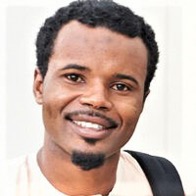 Mr. Basiru is an energetic leader from Cameroun. He is currently the Secretary General of the Network of Indigenous and Local Communities for the Sustainable Management of Forest Ecosystems in Central Africa (REPALEAC), which coordinates the work of Indigenous Peoples across 8 countries in the Congo Basin. For over a decade, Mr. Basiru has served Indigenous Peoples in Central Africa in supporting their aspiration towards an inclusive Indigenous People-led natural resources governance. He has been at the forefront of supporting the recognition of Indigenous Peoples in the region and in the protection of their rights as provided in UNDRIP. His experience and passion for serving Indigenous Peoples in central Africa is valuable in building collaboration and solidarity for Indigenous Peoples across Africa. The Christensen Fund Indigenous Leaders Program will enable Basiru to share his leadership experience and influence across Africa and promote collaboration with the network of global indigenous leaders.
Mr. Basiru is an energetic leader from Cameroun. He is currently the Secretary General of the Network of Indigenous and Local Communities for the Sustainable Management of Forest Ecosystems in Central Africa (REPALEAC), which coordinates the work of Indigenous Peoples across 8 countries in the Congo Basin. For over a decade, Mr. Basiru has served Indigenous Peoples in Central Africa in supporting their aspiration towards an inclusive Indigenous People-led natural resources governance. He has been at the forefront of supporting the recognition of Indigenous Peoples in the region and in the protection of their rights as provided in UNDRIP. His experience and passion for serving Indigenous Peoples in central Africa is valuable in building collaboration and solidarity for Indigenous Peoples across Africa. The Christensen Fund Indigenous Leaders Program will enable Basiru to share his leadership experience and influence across Africa and promote collaboration with the network of global indigenous leaders.
Rukka Sombolinggi (Indonesia)
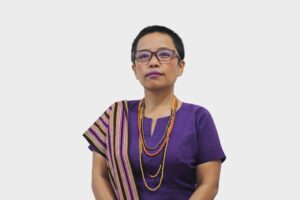 Rukka Sombolinggi is in her second term as secretary-general of the Indigenous Peoples’ Alliance of the Archipelago (AMAN). She was born and raised in Toraja, South Sulawesi, Indonesia, and belongs to the Indigenous Toraja, who inhabit the highlands of South Sulawesi. Prior to joining AMAN in 2000, Rukka was involved in the Indigenous Peoples’ movement through the Jaringan Pembelaan Hak-hak Masyarakat Adat (JAPHAMA) or Network for the Defense of Indigenous Peoples’ Rights, working group of Indigenous People and environmental activists that later gave birth to AMAN. In more than 20 years working at AMAN, Rukka has had various positions, including national advocacy staff, international advocacy coordinator, special staff to the secretary general, and deputy to the secretary-general for advocacy, legal, and political affairs. She also worked as a program specialist at the United Nations Development Program for the Regional Indigenous Peoples' Program in Bangkok, Thailand, in 2006-2010. Rukka holds a bachelor’s degree in agriculture from Hasanuddin University in Makassar, South Sulawesi, Indonesia, and a master’s degree in political science from Chulalongkorn University in Bangkok, Thailand.
Rukka Sombolinggi is in her second term as secretary-general of the Indigenous Peoples’ Alliance of the Archipelago (AMAN). She was born and raised in Toraja, South Sulawesi, Indonesia, and belongs to the Indigenous Toraja, who inhabit the highlands of South Sulawesi. Prior to joining AMAN in 2000, Rukka was involved in the Indigenous Peoples’ movement through the Jaringan Pembelaan Hak-hak Masyarakat Adat (JAPHAMA) or Network for the Defense of Indigenous Peoples’ Rights, working group of Indigenous People and environmental activists that later gave birth to AMAN. In more than 20 years working at AMAN, Rukka has had various positions, including national advocacy staff, international advocacy coordinator, special staff to the secretary general, and deputy to the secretary-general for advocacy, legal, and political affairs. She also worked as a program specialist at the United Nations Development Program for the Regional Indigenous Peoples' Program in Bangkok, Thailand, in 2006-2010. Rukka holds a bachelor’s degree in agriculture from Hasanuddin University in Makassar, South Sulawesi, Indonesia, and a master’s degree in political science from Chulalongkorn University in Bangkok, Thailand.
Kyle Whyte (United States)
 Kyle Whyte is a faculty member teaching environmental justice at the University of Michigan, where he is George Willis Pack Professor, University Diversity and Social Transformation Professor, and Professor of Philosophy and Native American Studies. He is founding Faculty Director of the Tishman Center for Social Justice and the Environment, Principal Investigator of the Energy Equity Project, and Senior Fellow in the Michigan Society of Fellows. His research focuses on Indigenous climate policy, planning, and justice, and the ethics of cooperative relationships between Indigenous Peoples and science organizations. He is an enrolled member of the Citizen Potawatomi Nation. Kyle is currently a U.S. Science Envoy for Indigenous and Local Knowledge, serves on the White House Environmental Justice Advisory Council, and is President of the Board of Directors of the Michigan Environmental Justice Coalition. Kyle has worked for two decades in advocacy of Indigenous climate justice. He collaborates within a network of diverse Indigenous Peoples and Indigenous-led educational institutions and organizations worldwide to advance self-determination in climate leadership, organizing, research, and education.
Kyle Whyte is a faculty member teaching environmental justice at the University of Michigan, where he is George Willis Pack Professor, University Diversity and Social Transformation Professor, and Professor of Philosophy and Native American Studies. He is founding Faculty Director of the Tishman Center for Social Justice and the Environment, Principal Investigator of the Energy Equity Project, and Senior Fellow in the Michigan Society of Fellows. His research focuses on Indigenous climate policy, planning, and justice, and the ethics of cooperative relationships between Indigenous Peoples and science organizations. He is an enrolled member of the Citizen Potawatomi Nation. Kyle is currently a U.S. Science Envoy for Indigenous and Local Knowledge, serves on the White House Environmental Justice Advisory Council, and is President of the Board of Directors of the Michigan Environmental Justice Coalition. Kyle has worked for two decades in advocacy of Indigenous climate justice. He collaborates within a network of diverse Indigenous Peoples and Indigenous-led educational institutions and organizations worldwide to advance self-determination in climate leadership, organizing, research, and education.
The Christensen Fund Elects Three New Indigenous Women Trustees
 As part of its commitment to have at least half of its Trustees be Indigenous Peoples, The Christensen Fund is pleased to announce that it has elected three new Trustees to its Board.: Ikal Angelei, Joan Carling, and Vicky Tauli-Corpuz.
As part of its commitment to have at least half of its Trustees be Indigenous Peoples, The Christensen Fund is pleased to announce that it has elected three new Trustees to its Board.: Ikal Angelei, Joan Carling, and Vicky Tauli-Corpuz.
“These three women are incredibly accomplished and expand The Christensen Fund’s Board beyond North America,” says Diane Christensen, Co-Chair of The Christensen Fund’s Board. “It is also extremely important that our Board now includes representatives from partner organizations. The addition of these Trustees enables our Board to better reflect the communities and partners that our organization works with to support the rights of Indigenous Peoples around the world, and is also a tangible demonstration of our commitment to self-determination for Indigenous Peoples.”
Carla Fredericks, CEO of The Christensen Fund, states, “I am thrilled that our Board has made this commitment to Indigenizing its Trustee leadership. These women are all heroes and stand as exemplary, powerful leaders within Indigenous communities and beyond. I look forward to continuing to work closely with our Board to support our partners in safeguarding the inherent rights and dignity of Indigenous peoples around the globe.”
The Christensen Fund’s newest Trustees are:
Ikal Angelei
Ikal is an environmental activist from Kenya. She is co-founder and Director of Friends of Lake Turkana, a grassroots organization that seeks to foster social, economic and environmental justice in the Lake Turkana Basin. Ikal completed a Master’s degree in Public Policy and Political Science at Stony Brook University in New York. In 2012 she was awarded with the Goldman Environmental Prize, particularly for her voicing on behalf of Northern Kenyan indigenous communities about the environmental implications of the Gilgel Gibe III Dam.
Joan Carling
Joan Carling is an indigenous activist from the Cordillera, Philippines with more than 20 years of working on indigenous issues from the grassroots to the international level. Her expertise includes human rights, sustainable development, the environment, and climate change. She was the General Secretary of the Asia Indigenous People Pact (AIPP) From 2008 to 2016 and was an indigenous expert member of the UN Permanent Forum on Indigenous Issues from 2014-2016. She was awarded the Champions of the Earth- Lifetime Achievement Award by UN Environment in September 2018. Ms Carling is the co-founder and currently the Executive Director of the Indigenous Peoples Rights International-IPRI.
Victoria Tauli-Corpuz
Victoria Tauli-Corpuz was appointed as the United Nations Special Rapporteur on the rights of indigenous peoples by the Human Rights Council in 2014, and served until April 2020.
She is an indigenous leader and a human rights expert from the Kankana-ey Igorot people of the Cordillera Region in the Philippines. As an indigenous activist, she has worked for over four decades on helping build movements, networks and institutions of indigenous peoples from the local to the global levels.
Ms. Tauli-Corpuz is the former Chair of the UN Permanent Forum on Indigenous Issues (2005-2010), and has served as the chairperson-rapporteur of the Voluntary Fund for Indigenous Populations. As an indigenous leader, she was actively engaged in drafting and adoption of the UN Declaration on the Rights of Indigenous Peoples from 1985 to 2007. She has founded and managed various NGOs involved in social awareness raising, leadership development, climate change and the advancement of indigenous peoples' and women's rights and she was a member of United Nations Development Programme Civil Society Organizations Advisory Committee.
In her capacity as the United Nations Special Rapporteur on the rights of indigenous peoples, Ms. Tauli-Corpuz provided expert testimony before the Inter-American Court of Human Rights, and the African Court on human and peoples’ rights and prepared policy advice to the World Bank, the Asia Development Bank, the World Intellectual Property Organisation (WIPO), among others.
Native Americans In Philanthropy Launches Historic Tribal Nations Conservation Pledge
Fifteen funders have committed over $100 million over the next five years to support Tribal-led biodiversity restoration and conservation
Washington, D.C. – Native Americans in Philanthropy and Biodiversity Funders Group, in partnership with 15 leading funders, announced the launch of the Tribal Nations Conservation Pledge today at the White House Conservation in Action Summit. To date, funders have committed $102.5 million over the next five years to support Tribal-led conservation work. The pledge calls on foundations and philanthropists to allocate a self-determined percentage or amount of funding to support the biodiversity and conservation efforts of Tribes, inter-Tribal organizations, and Tribal consortia.
The Tribal Nations Conservation Pledge demonstrates an important commitment to a new way of thinking about conservation that centers the people who are most impacted by climate and biodiversity crises but also hold the knowledge on how to best steward our lands and water. Indigenous people, especially in the United States, have been impacted by a changing environment that has upended traditional hunting and fishing practices, as well as livelihoods.
“Conservation is not just about safeguarding land. It’s about prioritizing people, especially those who hold the traditional knowledge on how to combat our climate and biodiversity crisis, and recognizing that they can chart a path forward,” said Erik Stegman, CEO of Native Americans in Philanthropy. “Through the Tribal Nations Conservation Pledge, Tribal Nations can continue to lead the way on the conservation of our lands and waterways, our agricultural systems, and our planet. We are grateful to our funders who are part of this turning point in the environmental space and understand the impact of grounding this work in Indigenous values and sustainability. ”
Native Americans in Philanthropy and the Biodiversity Funders Group are committed to educating and organizing funders around Tribal-led conservation opportunities, growing total commitment dollars, and changing how we address climate change. The leading funders that have already joined the Pledge and committed to supporting Tribal-led conservation are: The Alaska Conservation Foundation, The Christensen Fund, The Decolonizing Wealth Project, The Doris Duke Charitable Foundation, The Gordon and Betty Moore Foundation, The Grousemont Foundation, The JM Kaplan Fund, The David and Lucile Packard Foundation, The Resources Legacy Fund, Re:wild, The Walton Family Foundation, The Water Foundation, The Wilburforce Foundation, The William and Flora Hewlett Foundation, and The Wyss Foundation. The list will continue to grow as more funders commit to the Pledge.
“Biodiversity Funders Group (BFG) and our members are honored to lift up the importance of funding the conservation strategies and priorities of Tribal Nations, the original stewards of our environment,” said Lisa Pawlek Jaguzny, Director of Programs and Initiatives at the Biodiversity Funders Group. “This pledge is just the beginning of our partnership with Native Americans in Philanthropy to expand the circle of funders who are committed to a new, people-centered vision for conservation that is rooted in the leadership, knowledge, and traditions of Tribes.”
The collaboration of these funders represents a shift in philanthropic support for Tribal-led solutions in conservation work. Historically, less than 0.5% of philanthropic dollars have been allocated to Native communities, and fewer of those dollars have gone towards Native-led conservation. This Pledge is a turning point in climate funding that recognizes and supports Native communities who have long been leaders in this work.
“The Christensen Fund is a proud supporter and seed funder of this initiative which promotes and recognizes the self-determination and sovereignty of Tribes across the United States,” said Carla Fredericks, CEO of The Christensen Fund. “Since time immemorial, Native American Tribes and communities have lived out their commitment to our Mother Earth, in deep cosmological relationship with these landscapes and ecosystems. By providing funding at scale to Tribes to ensure generational protection of their homelands, we are investing in both Indigenous knowledge and the planet as a whole - a true win-win."
The Tribal Nations Conservation Pledge will be critical in ensuring that the U.S. meets the minimum goals of the 30 x 30 Initiative, a global effort to conserve 30% of the terrestrial and marine habitat by 2030. Tribal-led conservation methods are already focused on protecting and preserving biodiversity, and the pledge will help accelerate progress towards the global goal over the next seven years.
Native Americans in Philanthropy and the Biodiversity Funders Group encourage foundations to increase funding of Tribal-led biodiversity protection and preservation by pledging a percentage of their annual programmatic dollars to these efforts or by donating directly to the fund.
For more information, visit www.tribes.native philanthropy.org.
# # #
About Native Americans in Philanthropy
For over thirty years, Native Americans in Philanthropy has promoted equitable and effective philanthropy in Native communities. They do this through leadership development, education, research, and strategic partnerships with funders and philanthropic organizations. The cornerstone of their work is their relatives and their networks.
NAP supports several communities of stakeholders that work together to build knowledge, community, priorities, and power in the sector. These networks include Native professionals in philanthropy, elected Tribal leaders, Native youth leaders, Native philanthropic executives and board members, and Native nonprofit leaders.
About Biodiversity Funders Group
The Biodiversity Funders Group (BFG) is a professional association of environmental, conservation, and climate and energy grantmakers. We were founded in 1987 as the Consultative Group on Biological Diversity by a group of foundations and federal agencies to encourage funders to work together and leverage their resources. Today, approximately 75 funding institutions, predominantly private foundations, are formal members, while more than 200 other grantmaking institutions benefit from our activities as program partners.
Indigenous Leaders Spotlight: Meet Fawn Sharp

“Oftentimes, I think about my journey and my responsibility to the 3,000 people of the Quinault Nation…Holding public office means you have a sacred responsibility to honor the ones who spent their lifetimes and tremendous energy and resources to advance a nation.”
– Fawn Sharp, Public Servant and Fierce Indigenous Rights Advocate
Fawn Sharp is one of four Indigenous Leaders selected to participate in the first cohort of The Christensen Fund’s Indigenous Leaders Program for her work in serving Indigenous communities as a public servant.
Born in Aberdeen, Washington, President Sharp is a citizen of the Quinault Indian Nation, a “climate refugee” Tribe that is urgently relocating its ancestral coastal villages upland due to catastrophic flooding caused by sea level rise.
President Sharp currently serves as the 23rd President of the National Congress of American Indians (NCAI), the oldest, largest and most representative American Indian and Alaska Native tribal government organization in the country. President Sharp is also the current Vice President of the Quinault Indian Nation in Taholah, Washington, after being a five-term past-President. As a former past-President, she fought for the Quinault Nation’s economic growth while upholding their traditions of civil rights activism, public advocacy, and environmental protection.
She has previously served as a human rights attorney and in several state appointments. In 2021, she became the first elected Tribal leader to officially represent the United States of America on the international stage at the 2021 United Nations Climate Change Conference (COP 26).
Her work positions her to advocate for policies that serve the interests of tribal governments and communities throughout the United States.
Indigenous Leaders Spotlight: Meet Andrea Ixchíu
“I would like us to start honoring the lives of people who are taking care of our land all while experiencing the effects of climate change and facing violence from governments [like Guatemala’s] and the extractive industries that are causing the climate crisis and perpetuating colonialist behaviors in our lands and territories.”
- Andrea Ixchíu, Storyteller for Human and Environmental Rights
Andrea Ixchíu is one of four global Indigenous Leaders selected to participate in the first cohort of The Christensen Fund’s Indigenous Leaders Program for her work as an environmental and human rights activist.
Andrea is an Indigenous Maya K’iche born in Totonicapán, Guatemala, where she is recognized as a land protector of Totonicapan’s ancestral forest and has also served as an Indigenous community government authority. Alongside ongoing digital attacks, she has survived physical attacks on her life in retaliation to her reporting of illegal loggers operating in the Totonicapán forest.
Andrea works as a filmmaker, journalist, and activist in collaboration with local and international media. In these roles, she has launched local campaigns and youth workshops to denounce gender violence against Indigenous women, starred in the 500 Years documentary, and earned a nomination to participate in the Nobel Women’s Initiative for her opinion column in the Guatemalan newspaper, El Periodico, as well as for her reporting for independent media in Latin America.
She is a coordinator at Hackeo Cultural, a community-based, global initiative that seeks to build and strengthen collective strategies, narratives, and technologies for defending Indigenous territories across Latin America. She also leads the Futuros Indígenas project, which aims to raise actions, not awareness, to face the climate emergency.
Her work continues to uplift Indigenous perspectives and leaders through the power of storytelling and radical activism.
Indigenous Leaders Spotlight: Meet Ole Kaunga Mali

“This is not only a victory for the El Molo, Turkana, Samburu, and Rendille communities that have been affected by the Lake Turkana Wind Project but one for all Kenyan communities that are facing serious threats of displacement and human rights abuses from large land-based investments.”
-Ole Kanuga Mali, Lobbyist and Champion for Indigenous rights, after land deeds for the Lake Turkana Wind Project were declared “irregular and unlawful”
Ole Kanuga Mali is one of four global Indigenous Leaders selected to participate in the first cohort of The Christensen Fund’s Indigenous Leaders Program for his proven track record of defending the rights of Indigenous Peoples locally and globally.
Ole is a Laikipia Maasai pastoralist from the northern region of Kenya. Ole’s primary focus includes protecting Indigenous land, lobbying, and advancing Indigenous rights.
Ole previously worked and consulted with the International Labour Organisation (ILO) as an Indigenous peoples’ expert for its Africa Program on Indigenous and Tribal Peoples. He also brought an international legal case against the British government for using Maasai and Samburu grazing lands in Kenya for military training and leaving live ordinances that maimed and killed scores of Maasai and Samburu. His other lobbying and advocacy efforts include protecting Indigenous people affected by megaprojects, such as the Lake Turkana Wind Power Project and the Isiolo Dam.
Currently, Ole serves as the founder and Director of IMPACT , a co-founder of Maasai Cultural Heritage, and an advisor for both Nia Tero and Conservation International. He also leads the PARAN Alliance, a movement that connects and promotes learning, agency, and voices among Indigenous People-led organizations in Kenya.
His fight to expand Indigenous movements and rights has and continues to have a significant positive impact on Indigenous communities globally.
Indigenous Leaders Spotlight: Meet Joan Carling

“Indigenous peoples are not the enemies. We are not against development. We are conserving our environment for the future of humanity. But we cannot do this alone. The global community, governments, companies and civil society must act in solidarity, and assume responsibility for realizing sustainable development for all.”
-Joan Carling, Environment and Indigenous Rights Defender
Joan Carling is one of four global Indigenous leaders selected to participate in the first cohort of The Christensen Fund’s Indigenous Leaders Program for her work as an Indigenous rights activist and environmental defender.
Born in the Philippines as a member of the Kankanaey Tribe, Joan has defended land and Indigenous rights for over 20 years, from grassroots to international levels. Her primary focus includes ensuring the sustainable development of natural resources, mitigating the climate crisis, and upholding the human rights of Indigenous Peoples.
Joan’s work has included active participation in the UN Framework Convention on Climate Change and REDD+, serving twice as Secretary-General of the Asia Indigenous Peoples Pact and as Chairperson of the Cordillera People’s Alliance. She was also appointed by the UN Economic and Social Council as an Indigenous expert and has been a member of the UN Permanent Forum on Indigenous Issues. In 2018, she received the Champions of the Earth Lifetime Achievement Award from the United Nations Environment Programme.
In February 2018, the Duerte regime labeled Joan a terrorist in her hometown of Cordillera, Philippines, for her work and activism to end “development projects” and mining that would harm the land and displace Indigenous people. She left her home after receiving this threat to her life and security.
Currently, Joan serves as the Global Director for Indigenous Peoples Rights International, an organization that works to end the criminalization of people defending Indigenous rights.
In her work, she continues to build alliances and strengthen networks while centering Indigenous voices and raising them in front of policymakers.
Planting Seeds for Reparations in California
California Native American families, communities, tribes, and organizations are encouraged to apply for funds before September 15, 2022.
The Christensen Fund is proud to join the Decolonizing Wealth Project and the California Endowment in establishing a new fund to support Indigenous Californians’ efforts to preserve tribal history and further California’s effort to atone for its history of violence and wrongdoing against Native Americans. The new California Truth and Healing Fund provides California Native American families, communities, tribes, and organizations with resources to engage in opportunities associated with the goals of the landmark California Truth & Healing Council. The deadline for the first round of proposals is June 29, 2022, and the deadline for the second round of proposals is September 15, 2022.
With an initial $500,000 investment from the Decolonizing Wealth Project, The California Endowment, and the Christensen Fund, the goal is to raise more than $5 million. The fund is guided by an advisory board of Native Californians, including Pechanga Band of Indians Tribal Chairman Mark Macarro and Truth & Healing Council-member Kouslaa Kessler-Mata (Yak Tityu Tityu Chumash). Announcement of the fund received widespread media coverage in May, including stories in CalMatters, KQED, ABC10, and outlets across the state.
The Project has partnered with The California Truth & Healing Council, which Gov. Gavin Newsom established in 2019 to “clarify the record – and provide their historical perspective – on the troubled relationship between tribes and the state.”
The Council on Truth & Healing is expected to release a report on the historical relationship between the state and California Native Americans by 2025. Our hope is that the report will include recommendations to the Legislature about reparations or restoration of land for Native communities.
The Christensen Fund’s participation in this fund exemplifies our commitment to partner with other funders in supporting Indigenous rights, self-determination, truth telling and healing. We are committed to mobilizing our peers in philanthropy to support this fund, in particular, and the rights, self-determination, and leadership of Indigenous Peoples in general.
For California Native American families, communities, tribes, and organizations interested in applying for funding, and funders interested in contributing to our $5 million goal, learn more here.
The Christensen Fund Announces First Cohort of Indigenous Leaders Program
As part of The Christensen Fund’s commitment to Indigenous communities, leaders and organizations, we are excited to announce our inaugural cohort of our Indigenous Leaders Program. The program celebrates four Indigenous leaders from Mexico, Kenya, the United States, and the Philippines who are advancing the inherent rights, dignity and self-determination of their communities, Nations and Peoples, and work to achieve the promise of the United Nations Declaration on the Rights of Indigenous Peoples (UNDRIP). The program provides 100,000 USD to each leader to advance their unique vision and work. These Indigenous leaders will also have access to the full range of The Christensen Fund's philanthropic efforts, including networks, covenings, and speaking engagements.
The Leaders Program was developed collaboratively with these Indigenous leaders in order to respect their prior commitments and demands on their time. In the spirit of self determination, these leaders will focus on issues or projects that they determine themselves.
We are honored to introduce and welcome our 2022-2023 Indigenous Leaders Program Participants:
Joan Carling (Philippines)
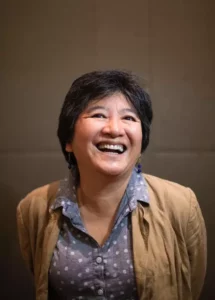 Joan is an Indigenous activist from the Cordillera, Philippines with more than 20 years of working on indigenous issues from the grassroots to the international level. Her expertise includes areas like human rights, sustainable development, the environment, climate change, and additionally the application of Free, Prior and Informed Consent. She is currently the Global Director for Indigenous Peoples Rights International.
Joan is an Indigenous activist from the Cordillera, Philippines with more than 20 years of working on indigenous issues from the grassroots to the international level. Her expertise includes areas like human rights, sustainable development, the environment, climate change, and additionally the application of Free, Prior and Informed Consent. She is currently the Global Director for Indigenous Peoples Rights International.
Ole Kaunga Mali (Kenya)
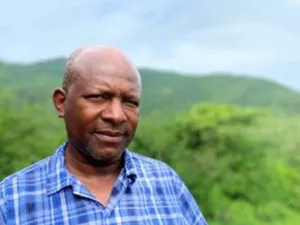 Malih Ole Kaunga is a Laikipia Maasai – a practicing pastoralist (keep Goats and Sheep) and a father of three daughters and two sons. Ole Kaunga has a proven track record of defending the rights of Indigenous Peoples locally and globally. He is the founder and Director of IMPACT and a co- founder of Maasai Cultural Heritage. He leads the PARAN Alliance, a movement that connects and promotes learning, agency and voices among indigenous peoples led organizations in Kenya.
Malih Ole Kaunga is a Laikipia Maasai – a practicing pastoralist (keep Goats and Sheep) and a father of three daughters and two sons. Ole Kaunga has a proven track record of defending the rights of Indigenous Peoples locally and globally. He is the founder and Director of IMPACT and a co- founder of Maasai Cultural Heritage. He leads the PARAN Alliance, a movement that connects and promotes learning, agency and voices among indigenous peoples led organizations in Kenya.
Andrea Ixchíu (Mexico-Guatemala)
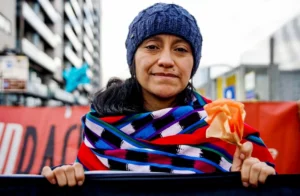 Andrea is an Indigenous Maya K’iche environmental and human rights activist, born in Totonicapán, Guatemala. She is a recognized land protector of Totonicapan’s ancestral forest where she has also served as an Indigenous community government authority. She works as a journalist, filmmaker and radialist, and collaborates with local and international media. Andrea is coordinator at Hackeo Cultural, a community-based with global reach initiative that seeks to build and strengthen collective strategies, narratives and technologies for the defense of Indigenous territories across Latin America. She also leads the Futuros Indígenas project that seeks to raise not awareness but actions, aimed to face the climate emergency.
Andrea is an Indigenous Maya K’iche environmental and human rights activist, born in Totonicapán, Guatemala. She is a recognized land protector of Totonicapan’s ancestral forest where she has also served as an Indigenous community government authority. She works as a journalist, filmmaker and radialist, and collaborates with local and international media. Andrea is coordinator at Hackeo Cultural, a community-based with global reach initiative that seeks to build and strengthen collective strategies, narratives and technologies for the defense of Indigenous territories across Latin America. She also leads the Futuros Indígenas project that seeks to raise not awareness but actions, aimed to face the climate emergency.
Fawn Sharp (United States)
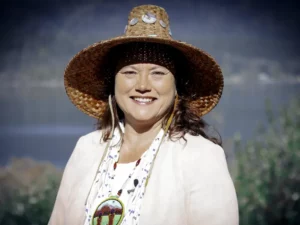 Fawn Sharp serves as the 23rd President of the National Congress of American Indians (NCAI), the oldest, largest and most representative American Indian and Alaska Native tribal government organization in the country. President Sharp is also the current Vice President of the Quinault Indian Nation in Taholah, Washington, after being a five-term past-President. Ms. Sharp has held numerous leadership positions, including a number of state appointments.
Fawn Sharp serves as the 23rd President of the National Congress of American Indians (NCAI), the oldest, largest and most representative American Indian and Alaska Native tribal government organization in the country. President Sharp is also the current Vice President of the Quinault Indian Nation in Taholah, Washington, after being a five-term past-President. Ms. Sharp has held numerous leadership positions, including a number of state appointments.

